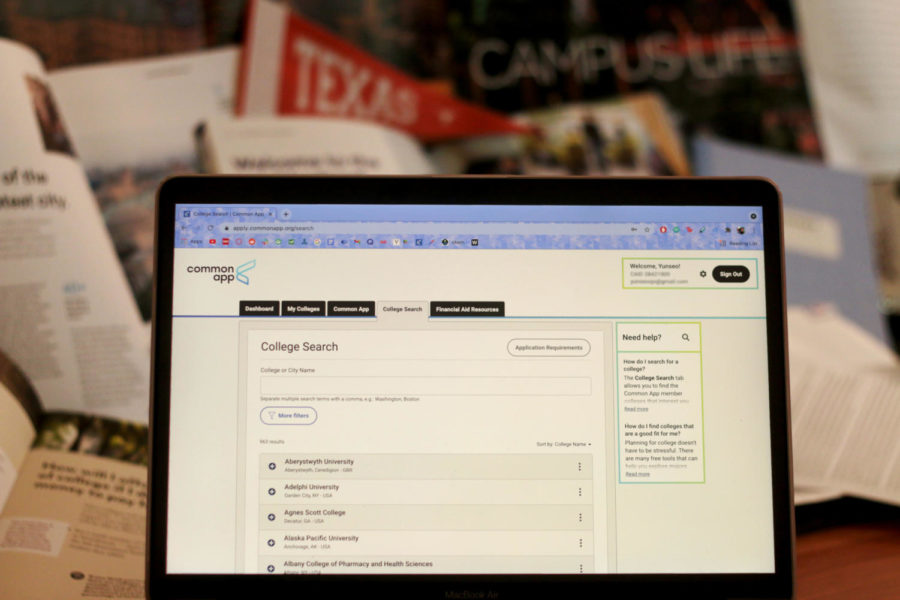Curating your college experience
A guide for current students by alumni
The following information has been collected from 2021 Hebron graduates Brooklynn Cnare, Delaney Dyer and Ethan Hoang. Cnare and Dyer both attend the University of Texas in Austin, and Hoang attends Collin College.
Choosing a Major:
The major that you decide on should align with your long term career goals, but deciding on that is not an easy task. Here are a few factors that should be considered when deciding on a major.
It is OK to be uncertain about a major—many colleges allow you to be ‘undecided,’
“It’s OK to not know what you want; we all have different views on what we want in life,” Hoang said. “If you’re completely lost on what to do, find your strengths and weaknesses.”
Determine your strengths, weaknesses and interests.
“[Chemistry] was the first class I [took] in high school where I wanted to learn more—beyond getting a test grade—so I thought about the applications of choosing a chemistry-related major in college,” Dyer said. “I still don’t know all of the answers, but I know that I am good at science and I have a lot of options with that no matter what I want to do in the end.”
Take time to get hands-on experience with your possible interests.
“Try out the career center,” Cnare said. “The career center has many courses, and if you find something that you’re relatively interested in, take it. If you have time over the summer, try out a summer camp.”
Choosing a School:
There are multiple factors to consider when choosing the perfect school for you, as different schools have their own valuable characteristics unique to its campus. Here are some main factors that should be considered when you are building your college list.
Location
Location plays an integral part of your college experience and can determine the cost of your education as well. Different schools may offer opportunities that allow students to make professional connections in the community, which can help with achieving long term career goals.
“[Some schools] were particularly not a fit for the kind of person I am,” Dyer said. “[I chose UT because] I liked Austin as a city and knew that networking opportunities were extensive.” Looking at cost, reputation and the resources the school can provide for you to thrive beyond graduation is very important.”
Student Life
Aside from the actual location of your school, the environment you will be surrounded by greatly impacts your educational experience. Many schools have different characteristics that are unique to their campus; take some time to make sure that the school is a right fit for you.
Departmental Strengths/Reputation
Universities have departmental strengths that can help you build a strong foundation for your long term career goals, so it’s important to do some research and take advantage of the resources the school has to offer.
“I ended up at UT because their architecture program was highly rated and it was something that [ interested me] when I was choosing my college,” Cnare said. “I wanted to make sure I was at a school that was good at what I wanted to do.”
Affording Education:
There are various ways to fund your education: government aid, loans, scholarships and more. Many school websites have a Net Price Calculator, which is an estimate of how much the school may cost (taking federal and institutional aid into consideration).
FAFSA
Offered by the Department of Education, the FAFSA is a form for students to fill out to apply for financial aid. It considers federal, state and institutional aid based on your financial background and needs. The application for this year’s upcoming cycle opens on October 1st.
CSS Profile
The CSS profile is offered by the College Board and focuses on financial situations, similar to FAFSA.
Institution Scholarships
Many schools offer scholarships that are specific to their campus. These scholarships may have separate deadlines, so check the institution’s website.
Private Scholarships
Websites such as Fastweb and Scholarships.com provide lists of scholarships sourced from companies or organizations that you can apply for. There may be different requirements or eligibility rules depending on the scholarship.
Additional Sources:
Below is a list of websites that can give you information on schools, scholarships and application advice. If you are wanting more detailed information, explore institutions’ websites and see if they offer informational sessions specific to their school.

Senior Yunseo Jo is a reporter and this is her first year on staff. She is a dog whisperer who enjoys reading and digital art.













